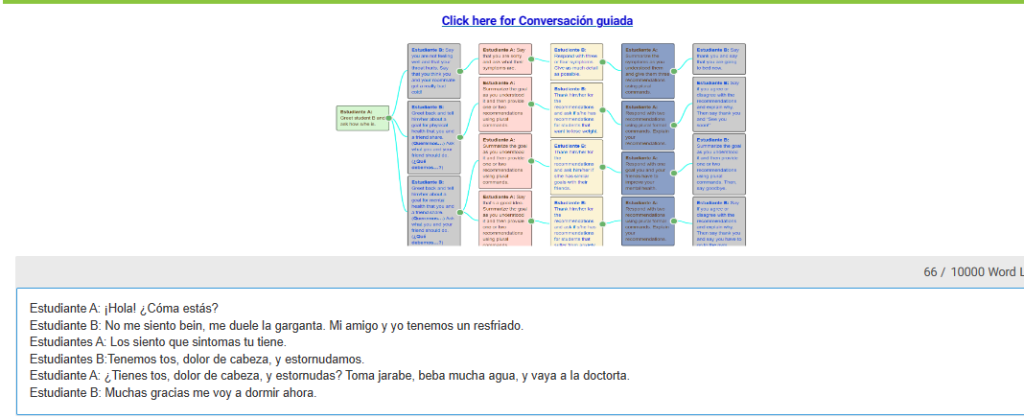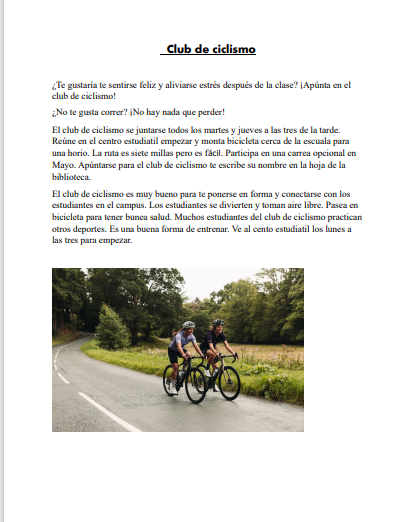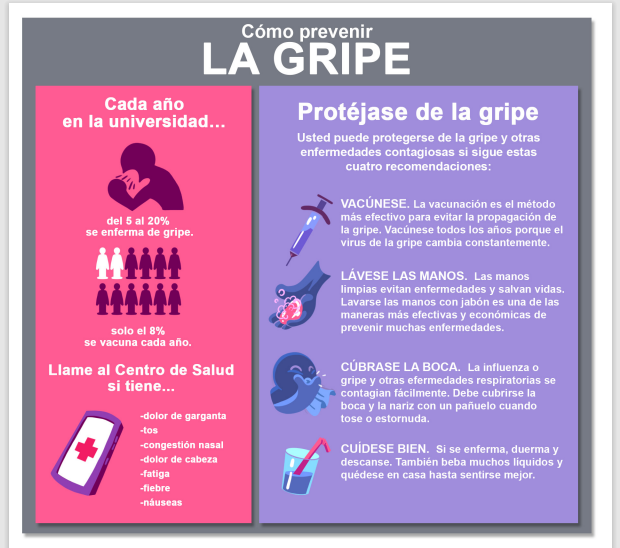Interpretive, Interpersonal, and Presentational Modes of Communication
Exploring Culture
The exploración cultural section for each chapter on Lingrolearning was a large help in getting examples of cultural differences between spanish speaking countries. Examples are speakers from different countries explained the sports, careers, and foods where they are from.
Hearing different people speak about their country helped me learn the career differences of females and males in different areas. Many other countries are less diverse and only men do physical labor jobs while women do secretary and babysitting jobs. In some countries only men do engineering and in others it is mainly women. Many other countries are also less diverse in sports and only men can be professional athletes. The most popular sport in spanish speaking countries was soccer but in some it was baseball. It changed my misconception that mainly men do engineering jobs because in some other countries it is mainly women.
Engaging in Communities
Engaging in immediate community is important because it helps to learn the language by holding conversations with other people in the language. It also helps in gaining new ideas and getting suggestions for improvement. Connecting with the global community is valuable because it helps to hear a fluent speaker talk in their language and is more realistic than memorizing vocabulary. Learning from people around the world also helps in understanding their culture and expanding on vocabulary.

Interpersonal Communication
In Talk Abroad, students held a fifteen-minute conversation with a fluent spanish speaker through video chat. There were two conversations, one was on family and sports, the second conversation was on food and health. Students also interacted with each other by discussion boards and writing conversations between each other in Lingro on sports, family, and health.
https://drive.google.com/file/d/1sATcuyCX0pfYOxBeddy1EJLwoC0onHTw/view?usp=drive_link
The conversations helped in realistically speaking in Spanish instead of memorizing individual words. They helped in having a better flow in speaking and thinking in the language instead of translating from English. The most difficult aspect of the conversation was consistency of not thinking in English without time in between. I overcame this difficulty by repetitive practice to get used to words only together in sentences not individually. Something I exceled in was using a wide range of vocabulary by a lot of review and extending learning outside the classroom.
The writing conversations with a partner in Lingro were good practice of how the vocabulary and grammar were used. Examples were a conversation of one person being sick and the other person giving recommendations on how to cure it. Another conversation was about family and students would ask questions such as if they have siblings or about the physical traits of people. The conversations helped in gaining new ideas from other people and having feedback. The most difficult aspect for me was the grammar rules of past and present tense. I got past this by seeing them many times and using photographic memory. Something I was good at was knowing the vocabulary such as cold symptoms, body parts, and names of family members. Regularly reviewing the vocabulary lists is what helped this skill.
Presentational Speaking
Students did a speaking project creating a video describing their family using a wide range of vocabulary on family member names and physical descriptions. We described what they like to do, personality traits, what they look like, and their relationship to us.
https://drive.google.com/file/d/18Fe1TCVkStVg7uj49ybyfMQLIweB07VL/view?usp=drive_link
The most challenging aspect of speaking was lasting the entire timeframe without breaks to think. I got past this by first writing it out then practicing it multiple times out loud without reading it. It was also challenging memorizing vocabulary from the previous semester a long with the new chapter. Something I was good at was pronunciation of words. I found it easy to catch on to vowel sounds in the Spanish accent. What I would do differently next time is put more focus on small but important grammar rules.
Presentational Writing
Examples of writing activities were creating an ad for a sports club and a flyer for how to prevent a sickness. We used the sports vocabulary including sports names and exercise activities. The health ad used vocabulary including symptoms of sicknesses and how to prevent them.
Students wrote a newsletter promoting a sports club for the school using future tense and proper commands. Writing the sports ad helped better understand when irregular and reflexive verbs were used and how to use them. It also helped learn informal commands along with sports vocabulary and the activities associated with them. The most difficult part for me was remembering informal tu commands of irregular verbs I got past this by putting more focus on the words that did not fit a pattern. The writings helped expand in spelling, using grammar rules properly, and expansion of vocabulary. Writing the health ad helped in using formal usted commands and reflexive verbs along with extending vocabulary on health. The most difficult aspect was knowing when and how to use reflexive verbs. I improved in it by seeing more examples and understanding its meaning.

Interpretive Listening
We listened to different people speak about their culture of foods, careers, and sports. For each chapter in Lingrolearning there is a section where different people speak about the topic from their country’s perspective. We also listened to an ad for a meal kit delivery service and an ad from a career resource center explaining jobs.
Listening to other people speak was good for understanding the pronunciation of words. The meal kit ad was helpful in expanding knowledge of food names and verbs associated with cooking. The most challenging aspect was keeping up with the speed of speech from fluent Spanish speakers. I listened to the videos multiple times to help hear and understand clearer. I found the most interesting thing to listen to was people explaining genders associated with jobs in their countries because some differ from ours. My takeaway from listening was better grasping of pronunciation and learning cultural differences.
Interpretive Reading
Students read realistic examples of the topics being used such as newsletters for student sports events and flyers on how to prevent health problems. The readings helped us better understand how the vocabulary and grammar were used such as conjugating words and using reflexive verbs.

The sports newsletters gave good examples of many sports names and how the verbs associated with them are used. It also showed how to use a lot of grammar such as commands, irregular verbs, and correct conjugations. Reading helps with learning grammar, spelling, and placement of accent marks. The most difficult aspect for me was memorizing the rules of irregular verbs. Rewriting them multiple times and catching on to the pattern helped in memorization. The most interesting thing to read was examples of food recipes because it gave good examples of the vocabulary and could be used in real life. My biggest takeaway from reading is improvement of spelling and knowledge of how grammar rules work.